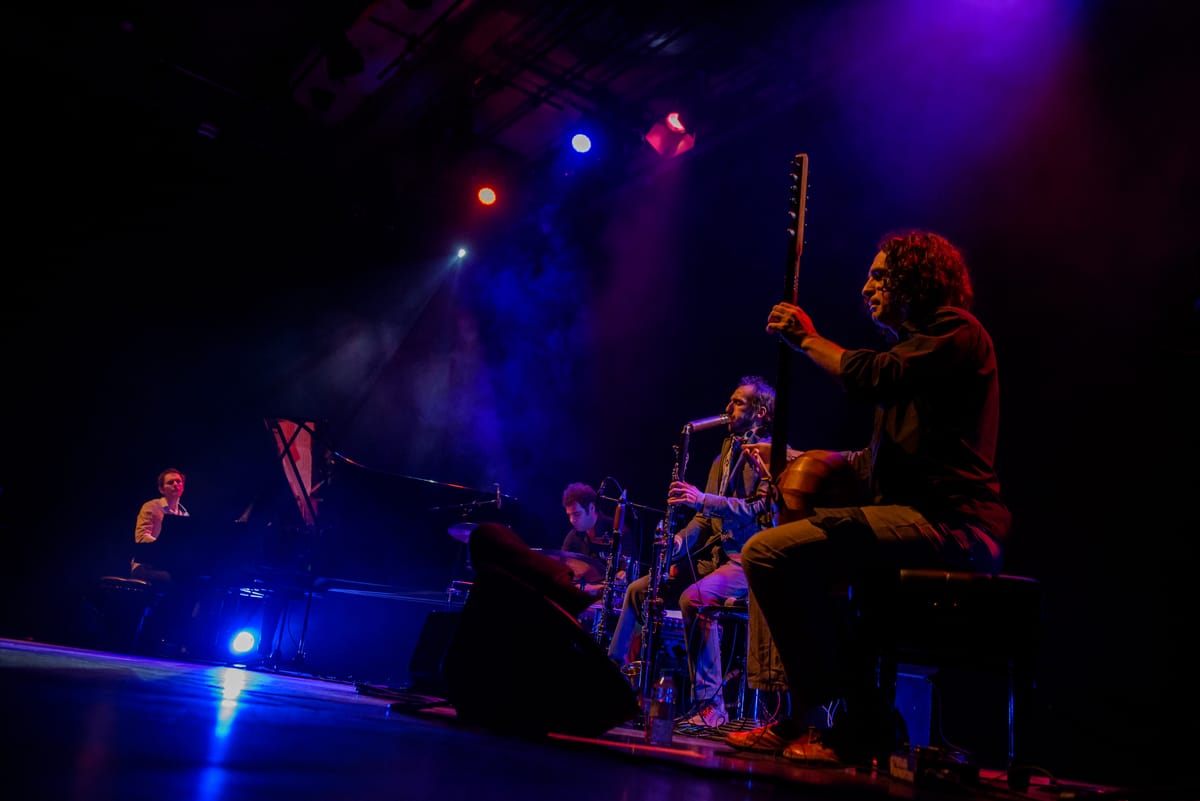Review: Arifa performs at London Jazz Festival

Photo: Razvan Danaila
Daniel Avis
As Arifa took to the stage at the Purcell Room in London, there was an inescapable sense of anticipation among the audience. This was the band’s first foray into London, and it came on November 18th, as part of this year’s London Jazz Festival.
After two internationally-acclaimed albums, and a strong following in the Netherlands, Arifa had come to bring their tasteful fusion of Middle-Eastern rhythms, Balkan clarinet, and Western jazz harmony to London’s Southbank.
The interesting question for me before this gig began was how exactly they would fare at building this ‘bridge of sounds between the Orient and Occident’ (their words, not mine), and still escape the cries of Orientalism that would surely follow?
The answer soon became clear. They would do so through a tasteful blending of styles, honest to their origins, and yet still pushing at musical boundaries at every opportunity.
As the charismatic Romanian clarinet player Alex Simu opened the proceedings with a sorrowful and melancholic improvisation, it became evident that this bunch of multi-cultural musicians had both serious talent and a wide range of musical styles at their fingertips.
After Alex’s moment in the spotlight, the band launched headfirst into their first song Red Ink, with strong counter-melodies provided by the Greek tarhu player Michalis Cholevas.
For those people, like myself, who didn’t know beforehand, the tarhu is a relatively new addition to the string family, which combines the Ottoman tanbur with the Chinese erhu, resulting in a very interesting blend of tones.
I was struck by the harrowing, hoarse counter-melodies that Michalis managed to conjure up on the tarhu, cutting with calculated precision through the mellow groove created by the rhythm section of German pianist Franz von Chossy and Dutch/Turkish percussionist Sjahin During to bring the music to life
However, the tarhu really came into its own on songs like Secret Poetry, which was one of the calmer numbers in this set. Secret Poetry began with a slow, sorrowful melody on the tarhu. Alex, this time on bass clarinet, then added to the texture with a highly ornamented rendition of the melody. The soaring, mournful melody was offset by the Franz’s relentless broken chords on the piano, and Sjahin’s quite innovative use of the frame drum, creating a busy pitter-pattering of rhythmic finger rolls, flicks and slaps to drive the piece forward.
Arifa’s sound draws many parallels with the smooth and effortless style prevalent in that well-known, jazz-tinged band of ex-SOASians, Portico Quartet. However, what I feel they managed to do well in this concert was to transition seamlessly from this sound towards that of well-known Turkish musicians like the Klarnet virtuoso Selim Sesler, and back again. At these points in the concert the melodies became more intricately ornamented, the pitch of the notes less stable, and the music more emotional and expressive.
The two stand out songs for me in this concert were Anatolian Alchemy, a harrowing tune on which Alex Simu’s clarinet-playing really had a chance to shine, and the encore Shiraz, which took inspiration from a well-known Iranian folk song and transformed it into Arifa’s particular brand of ‘jazz fusion’ through the use of fast-paced rhythmic accompaniment and complex melodic exchanges between the clarinet and the tarhu.
The audience, who had seemed a little hesitant beforehand, were clearly transformed by the concert, and Arifa left London to rapturous applause. ‘Oriental’ lounge music this was not. They played a fast-paced and eclectic concert, and left the audience hungry for more. Their UK tour has now concluded, but judging by this gig, they will surely be back in London again in the not-too-distant future.



